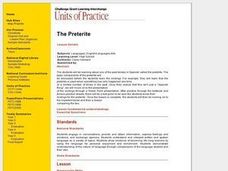Curated OER
Spanish Animal and Sounds
Students memorize the names of farm animals and the sound they make in Spanish. In this Spanish vocabulary lesson plan, students use total physical response, music and games to learn the names of nine farm animals and the sounds they...
GeorgiaStandards.org
Family and Friends
Build your own Spanish unit about family and friends with these assessments and activities! Included here are several summative assessments to choose from and many activity ideas, cross-curricular tasks, and formative assessments...
Curated OER
Immersion: Basic greetings
Hola, buenos dias! One method of language teaching requires the teacher to create an immersion classroom, meaning that no English is spoken. This plan shows how a teacher would go about modeling phrases to teach greetings and appropriate...
University of Texas
Alphabetic Understanding, Phonics, and Spelling
Have your youngsters reading in no time with with collection of literacy activities and lessons. Starting with a basic understanding of the alphabet, this unit progressively builds students' phonemic awareness and ability to decode...
Curated OER
Spanish Days of the Week/Counting
Pupils practice using the Spanish words for the days of the week and numbers. They use a calendar to help them with the activity. They also demonstrate their ability to say "tomorrow will be" and "yesterday was".
Curated OER
Counting in Espanol
Students create a mini-book with the Spanish numbers 0-10, then compare and contrast the English numbers to the new Spanish numbers.
Curated OER
Superlative Form
Students examine how to correctly use and form the superlative form. They practice writing and speaking Spanish words using the correct superlative form. Students complete a worksheet using the superlative form of words correctly.
Curated OER
The Preterite
Students practice one of the past tenses in Spanish called the preterite after the teacher presents the provided Power Point presentation.
Achieve3000
Discriminating Phonemes
Develop the fluency of beginning readers one sound at a time with this phonemic awareness lesson. Through a series of whole-class instruction, independent practice, and collaborative learning activities, children practice...
Curated OER
Child's Play: Loter¿¿a Game
Students review and define ten Spanish vocabulary words from previous lessons, practice communicating ideas by generating descriptions for items in Spanish using prior knowledge, synonyms, circumlocution, and dictionaries, and play...
Curated OER
Child's Play II: Loteria Game
Students use flashcards to memorize the Spanish words for numbers. In groups, they write and solve addition, subtraction, multiplication and division problems. They play another round of the game in which they can only give the problem...
Visa
Pro Lesson Module — Financial Football
Learners won't fumble their knowledge of personal finance after an engaging game of Financial Football! As they choose their favorite teams and desired plays, young economists demonstrate their financial literacy with a question...
Curated OER
Preterite Forms of -AR, -ER, -IR Verbs
Students explore how to form the preterite forms of regular -AR, -ER, and -IR verbs. They complete a variety of written task in which they write the correct preterite forms of the verbs. Students complete a worksheet finding the correct...
Curated OER
Geography and Artifacts of Mexico
Young scholars review the structure of government in Mexico and discuss how it is different than the United States. Using artifacts, they must label and identify the city or state in which the artifact originated. They use the artifact...















